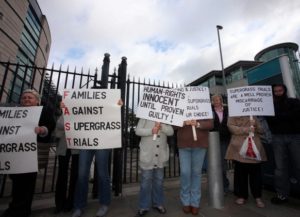
Il trentasettenne adesso aspetta “un sonno ristoratore” dopo aver completato i contro interrogatori nel processo in corso al tribunale di Belfast.
Per il giudice Gillen sembra che “la fine sia in vista” per la testimonianza del terrorista lealista reo confesso che, insieme al fratello David Ian, ha coinvolto altre 14 persone in numerosi reati UVF.
Il giudice, che presiede il processo senza giuria, ha detto a Stewart che dovrebbe “guardare avanti” per porre fine alla sua testimonianza, possibilmente entro metà settimana.
Stewart rispose subito che era impaziente di fare “una buona dormita, mio signore”.
All’inizio della sua ultima testimonianza Stewart aveva ammesso alla corte di non aver risposte alle discrepanze in alcune parti della sua confessione tra quanto aveva inizialmente detto alla polizia e poi in aula.
L’ammissione è giunta quando l’avvocato difensore Philip Magee ha interrogato Stewart sul suo stato d’animo, e su quanto aveva detto alla polizia e poi in tribunale.
“La verità della questione è”, ha detto Magee, “che lei non riesce a ricordare quale sia la verità”.
Magee ha continuato a pressare Stewart, chiedendo se la sua mente gli aveva detto di indicare la gente come delinquenti senza averli mai menzionati prima.
“Ha sentito una voce… mettere la gente dentro?” ha proseguito Magee.
Negando il suggerimento, Stewart ha sostenuto che “era solo un errore”.
Tuttavia, Magee ripetuto la domanda. Aggiungendo: “Avete dato alla gente ruoli da comparse o da estranei, e questa è la verità?”
“Questo è errato”, ha risposto Stewart.
Anche se ha negato di “sentire voci”, Stewart in seguito ha ammesso di fronte all’avvocato difensore Mark Barlow che quando ha fatto il nome di uno dei suoi clienti, David Smart, era stato perché c’era “solo qualcosa nella mia mente che mi diceva che lui era presente”.
Loyalist supergrass denies ‘voices in his head’
The 37-year-old witness said he is now looking forward to “a good sleep” once he completes his evidence in a marathon Belfast Crown Court trial.
Trial judge Mr Justice Gillen said it looked as if “the end is in sight” for the evidence of the self-confessed terrorist who, along with his brother Ian, has implicated 14 others in a catalogue of UVF crimes.
The judge, sitting without a jury, told Stewart he should “look forward” to ending his evidence, possibly by mid-week.
Stewart quickly replied he was looking forward to “a good sleep, my lord”.
Earlier yesterday Stewart admitted to the court that he has no answer to discrepancies in parts of his evidence in what he had initially told police and then the court.
The admission came as defence SC (State’s Counsel) Philip Magee quizzed Stewart about his state of mind, and what he had told police and the court.
“The truth of the matter is,” said Mr Magee. “You can’t remember what the truth is.”
Mr Magee continued to press Stewart, asking if his mind was telling him to put people forward as offenders who had never been mentioned before.
“Do you hear a voice … put people in?” continued Mr Magee.
Denying the suggestion, Stewart maintained that “it was just an error”.
However, Mr Magee repeated the question. He added: “Do you give people walk on and walk off parts, and that’s the truth of it?”
“That’s incorrect,” said Stewart.
Although he denied “hearing voices”, Stewart later admitted to defence barrister Mark Barlow that when he named one of his clients, David Smart, he had done so because there was “just something in my mind told me that he was there”.
The case continues on Monday.